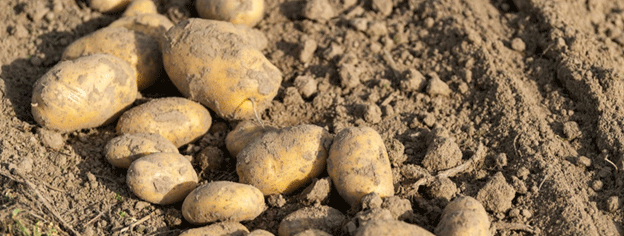Potato farming in Bavaria is under severe threat from the Reed Glassy-Winged Leafhopper (Hyalesthes obsoletus), a small insect less than a centimeter long, yet capable of causing devastating crop damage. Once limited to sugar beet fields, this pest has now expanded its reach to include potatoes, leading to substantial economic losses for farmers and potentially threatening the potato-processing industry in Bavaria.
A Growing Threat to Bavarian Potatoes
The first signs of infestation are seen in the potato plants themselves. Leaves begin to curl and discolor, a telltale symptom of infection by the bacteria Stolbur and SBR (Southern Beet Rhizomania), both transmitted by the Reed Glassy-Winged Leafhopper. As the disease progresses, it results in gnarled, rubbery potatoes, commonly referred to as “gummy tubers,” while other tubers remain stunted and undersized. Farmers in Bavaria report yield losses of up to 50%, a significant blow to agricultural productivity.
Although the problem has been known in sugar beet production, where it’s especially prominent in regions like southern Würzburg, the pest’s recent shift toward potato crops is alarming. The Reed Glassy-Winged Leafhopper migrates an estimated 30 kilometers per year, steadily expanding its territory. Northern Bavaria, including regions like Schwaben and Altbayern, has seen a marked increase in the pest’s density. This poses a critical threat, as potatoes play a far more substantial role in the agricultural economies of these areas compared to regions where sugar beet is dominant.
Industry at Risk
The potato-processing industry is deeply concerned about the future availability of raw materials. Companies like Burgis in Neumarkt in der Oberpfalz and Südstärke in Sünching and Schrobenhausen depend heavily on local potato supplies. “If our raw material is no longer available, it could be existentially threatening,” says Timo Burger, CEO of Burgis. Currently, neither Burgis nor Südstärke have reported infestations, but the looming threat is palpable as the insect continues its spread. Importing potatoes from further afield isn’t a viable solution due to prohibitive transport costs.
Adding to the challenge, the Reed Glassy-Winged Leafhopper has begun targeting other crops, including carrots and red beets. According to Helen Pfitzner, coordinator of the Cicada Research Group for the Union of German Potato Industry (UNIKA), this expansion of host plants presents an additional danger to the regional food supply. “The newly identified spread of the pest to carrots and red beet threatens the sustainable supply of essential fresh plant-based foods in Germany,” says Pfitzner.
No Effective Countermeasures—Yet
One of the most pressing concerns is the absence of effective plant protection methods. Currently, there are no approved chemical solutions for combatting the Reed Glassy-Winged Leafhopper. Research is in the early stages, with institutions like the University of Regensburg exploring RNA-based plant protection. This technology aims to selectively disable vital genes in the insect, potentially halting its ability to transmit disease. Meanwhile, the Bavarian State Research Center for Agriculture (LfL) is conducting trials on potato varieties to identify those less susceptible to the pest. Preliminary findings suggest that early-harvest potatoes are less affected, but these varieties aren’t suitable for processing into products like fries or chips.
Farmers, such as Reiner Lesch from Gaukönigshofen in Würzburg, are already feeling the impact. “In 2023, the damage was catastrophic—almost a total loss, with nearly no harvestable product,” he laments. Although rainfall this year helped minimize the infestation’s effects, many farmers are unsure of how to proceed and have already reduced their potato cultivation areas. Lesch himself has decided to stop planting late-maturing potato varieties, which are most vulnerable to the insect’s attack.
What Lies Ahead for Potato Farming in Bavaria?
Experts fear that without swift and effective interventions, potato farming in Bavaria’s key growing regions could be severely curtailed, or in the worst case, abandoned altogether. This would not only threaten the livelihoods of farmers but also the region’s potato-processing industry, which relies heavily on locally sourced crops. As Timo Burger from Burgis emphasizes, importing potatoes isn’t a feasible long-term solution due to rising transport costs, which would undermine the economic viability of the sector.
The insect’s spread to other crops, such as carrots and red beet, complicates the situation further, raising concerns about the broader food supply in Germany. Agricultural scientists and industry leaders are hopeful that ongoing research will lead to practical solutions before the damage becomes irreparable. However, time is of the essence, and there’s no guarantee that advances in RNA-based pest control or resistant potato varieties will arrive soon enough to prevent significant losses.
The Reed Glassy-Winged Leafhopper represents a growing crisis for potato farmers in Bavaria. With no effective countermeasures currently available, the region faces a potential collapse in its potato production, with ripple effects for both farmers and the potato-processing industry. Immediate action in research, pest management, and industry collaboration is critical to safeguard the future of Bavaria’s agriculture. Unless solutions are found quickly, farmers may be forced to reduce or abandon potato cultivation, threatening the availability of a key food crop in the region.






